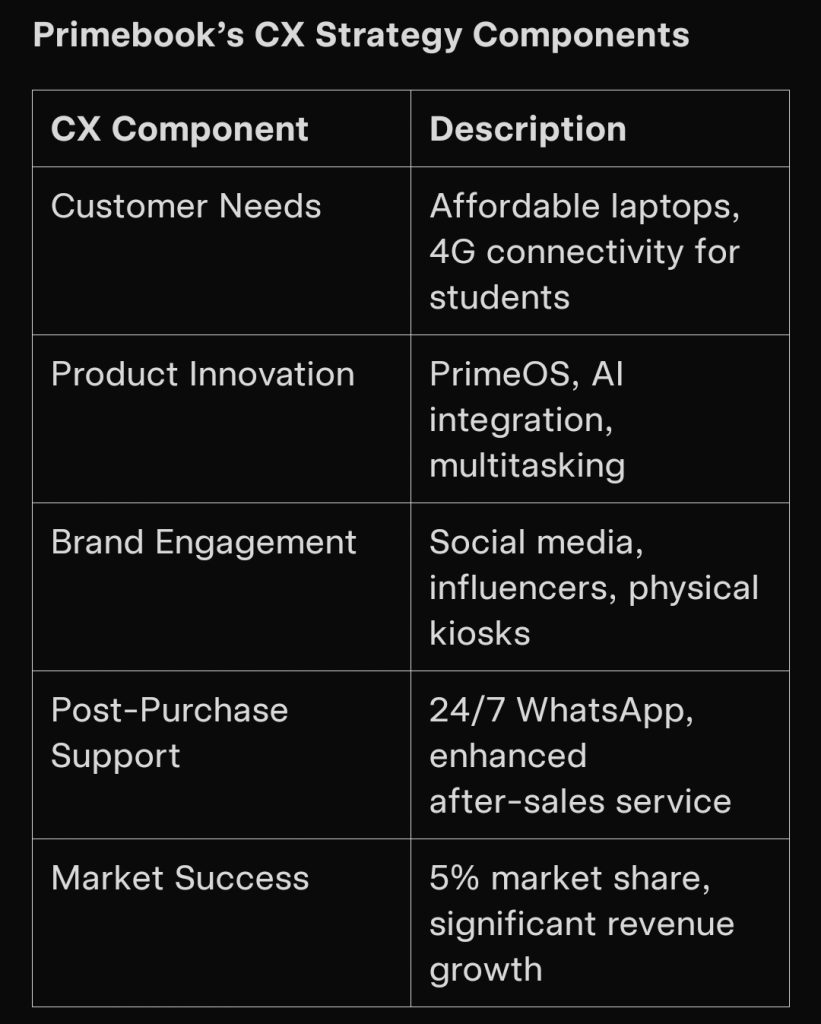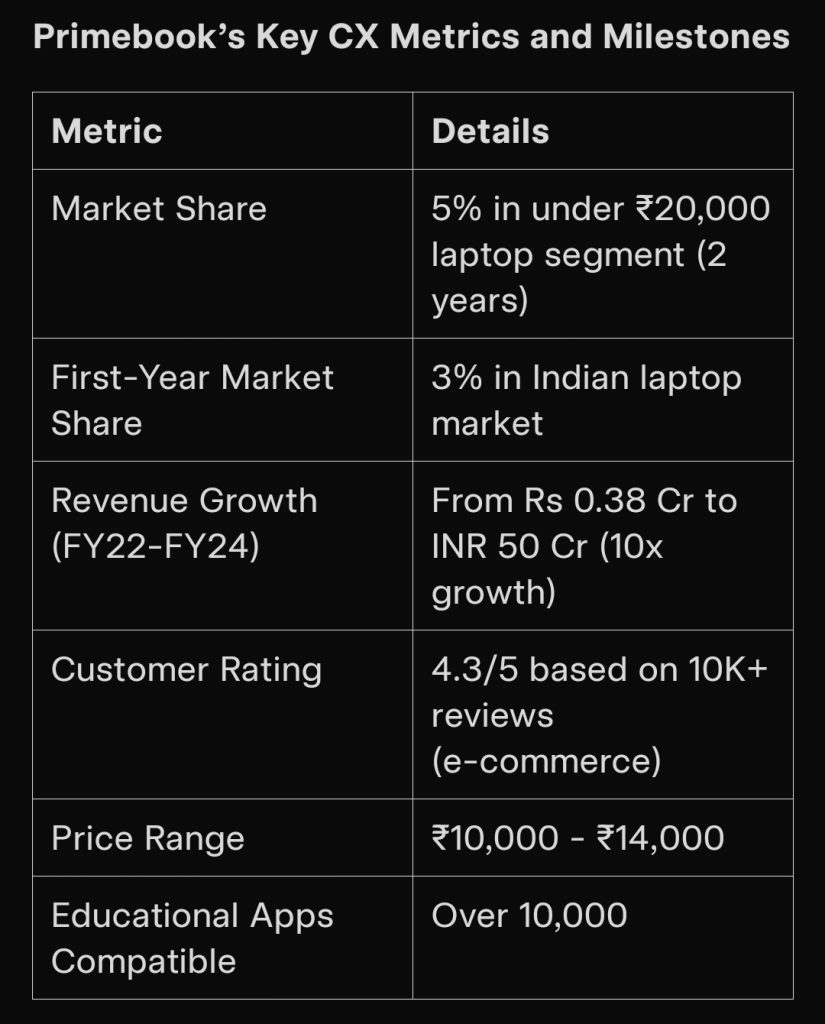Primebook Customer-Centric Approach to Democratizing Education
Primebook, a Delhi-based startup founded in 2017 by Chitranshu Mahant and Aman Verma, has emerged as a significant player in India’s education technology sector, focusing on customer experience (CX) to democratize access to affordable computing. Their recent press release on April 29, 2025, announced a successful Pre-Series A fundraise of $2 million, led by investors such as Inflection Point Ventures, Auxano Capital, NexG Devices, and high-net-worth individuals like Rikant Pittie and Bhavesh Gupta. This funding milestone, combined with their appearance on Shark Tank India Season 2, where they secured INR 75 lakh, underscores the growing confidence in Primebook’s mission to empower students and digital-first learners.
Funding and Investor Confidence: A CX Validation
The $2 million funding, comprising equity and debt, validates Primebook’s customer-centric business model. Prior to this fresh funding, PitchBook and Crunchbase indicate total funding of $1.39M, including the Shark Tank investment of Rs 75 lakh (approximately $90,000). For CX professionals, this highlights the importance of transparent communication in building trust, a core CX principle.
Investor quotes from the press release emphasize Primebook’s potential. Ankur Mittal, Co-Founder of Inflection Point Ventures, noted, “Primebook addresses critical issues like limited access to affordable laptops and poor connectivity in remote areas with low-cost devices offering 4G connectivity and a user-friendly Android-based interface.” Bhavesh Gupta, Ex-COO of Paytm, added, “Investing in Primebook meant investing in the ever-expanding personal computing industry that’s certain to turn hybrid over the next ten years.” These endorsements reinforce Primebook’s CX strategy, focusing on affordability and innovation.
Understanding Customer Needs: Addressing the Digital Divide
Research suggests Primebook’s approach enhances education access, particularly in India, where only 1 in 10 children use computers for learning, per their blog. They target students from Classes 2 to 10 and exam preparers, offering laptops priced between ₹10,000 and ₹14,000, addressing affordability. The inclusion of 4G connectivity tackles connectivity challenges in remote areas, aligning with CX principles of meeting specific customer needs.
Their mission, “democratize computing,” resonates with Gen Z, who value brands with social missions. Their focus on underprivileged students through NGO partnerships, distributing laptops to economically vulnerable learners, is enhancing inclusivity. This customer-centric focus creates trust and loyalty, key CX metrics.
Product Innovation and CX: Tailoring Technology for Learners
Primebook’s proprietary operating system, PrimeOS, built on Android 11, is a CX cornerstone. With over 3 million users across 140 countries, it offers a user-friendly interface, compatible with over 10,000 educational apps like Physics Wallah and Coursera. Planned enhancements, such as AI integration, Cloud PC capabilities, and cross-platform integrations, promise to personalize the learning experience, aligning with CX trends of innovation and user-centric design.
Their laptops, assembled by PLI-approved manufacturers in India, ensure quality at affordable prices, crucial for a price-sensitive market. Features like 64GB storage (expandable to 200GB), 8-hour battery life, and multitasking support cater to student needs, reducing friction in the customer journey. For CX professionals, this illustrates how product innovation can address pain points, creating seamless experiences.
Brand Building and Customer Engagement: Connecting with Gen Z
Primebook’s brand strategy is customer-centric, targeting Gen Z with a revamped visual identity and messaging. They plan full-funnel digital campaigns across Instagram, YouTube, Google, Flipkart, and Amazon, using platform-specific content. Collaborations with tech influencers, student vloggers, and edu-creators build authentic product stories, fostering community trust.
Physical kiosks and tech events, as outlined in the press release, will enable direct engagement, ensuring omnichannel consistency. Their focus on Tier 2, 3, and 4 cities, where students are new to laptops, is aligning with their CX strategy of accessibility. For CX professionals, this demonstrates leveraging multiple channels to build loyalty, especially in digital-first generations.


Post-Purchase Experience: Ensuring Long-Term Satisfaction
In a price-sensitive market, post-purchase support is vital. Primebook plans to enhance after-sales service infrastructure, per the press release, ensuring reliability. Their customer service, includes a 24/7 WhatsApp chatbot and customer care executives available from 10 AM to 7 PM daily, addressing issues like order status, technical support, warranty, and returns. This focus on the entire customer journey aligns with CX best practices, fostering long-term relationships.
An average customer rating of 4.3 out of 5 based on 10K+ reviews on e-commerce platforms, indicates high satisfaction. For CX professionals, this emphasizes extending CX beyond the product, ensuring every interaction reinforces brand commitment.
Market Success and Future Plans: Measuring CX Impact
Primebook’s CX strategy has driven market success. They captured 3% market share in their first year, growing to 5% in the under ₹20,000 segment after two years. Revenue grew from Rs 0.38 crore in FY22 to INR 50 Cr in FY24, turning profitable, showcasing a 10x year-over-year growth.
Future plans include expanding institutional sales, launching Primebook 2.0 in April 2025, and strengthening R&D for PrimeOS. All these are aimed at enhancing CX. For CX professionals, this trajectory offers a blueprint for scaling strategies, balancing innovation with accessibility.
Conclusion and CX Takeaways
Primebook’s journey highlights how CX can drive social impact and business success. By addressing customer needs, innovating with purpose, engaging through multiple channels, and ensuring post-purchase support, they’re transforming education access. For CX professionals, key takeaways include identifying pain points, tailoring solutions, building brand trust, prioritizing support, and measuring impact. This model sets a benchmark for tech firms in emerging markets.

